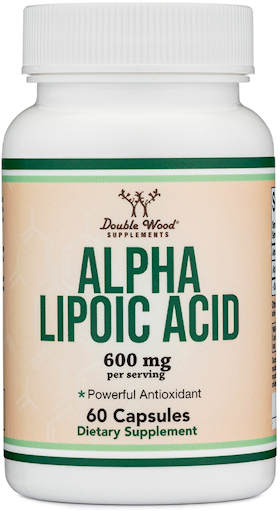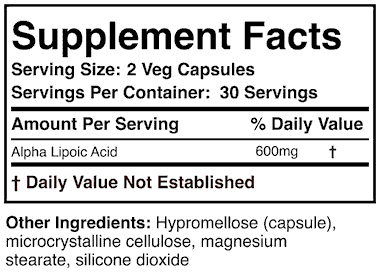- Improving lives since 2002
- Fast, Friendly Service
- Free Nutritional Counseling
The key to health is eliminating toxicities and deficiencies! - Dr. William R. Kellas

Alpha Lipoic Acid (thioctic acid) does double duty. It is required by mitochondrial enzyme complexes (pyruvate dehydrogenase & α‑ketoglutarate dehydrogenase) and, together with its reduced form DHLA, it helps maintain the body’s antioxidant network across water and lipid membranes.*
Because Alpha Lipoic Acid is small and amphipathic, it crosses cellular membranes — even the blood–brain barrier — to reach nerves, vessels, and metabolic tissues. Many people notice steadier energy and clearer thinking when cellular redox is supported.*
⚡ Why Alpha Lipoic Acid matters more with age: Mitochondrial efficiency and endogenous antioxidants decline over time. Alpha Lipoic Acid supports energy enzymes and regenerates antioxidants — helping keep tissues resilient.*
Guidance on dosing & timing is below. See the studies section for clinical trials and reviews.
Universal antioxidant • Mitochondrial cofactor • Nervous system & metabolic support*
*Dietary supplements aren’t intended to diagnose, treat, cure, or prevent disease. Consult your healthcare professional.
Typical amount: 300–600 mg/day; some protocols use 600 mg twice daily. Timing: Best on an empty stomach (30 minutes before or 2 hours after meals) — food can lower bioavailability.*
*These statements have not been evaluated by the FDA. This product is not intended to diagnose, treat, cure, or prevent any disease.
Comparative Retail Price: to be added
Our Price: to be added
Alpha‑Lipoic Acid (Alpha Lipoic Acid)


Take Alpha Lipoic Acid on an empty stomach: 30 minutes before, or 2 hours after, meals.
Normal use: One capsule daily.
Usage range: One or two capsules up to twice daily
Pair with: acetyl‑L‑carnitine, CoQ10, and magnesium as desired.*
Notes: Alpha Lipoic Acid may lower blood sugar; monitor if using glucose‑lowering meds. Separate from mineral supplements by 1–2 hours. If you use thyroid medication, take Alpha Lipoic Acid at a different time of day and consult your clinician.*
*These statements have not been evaluated by the FDA. This product is not intended to diagnose, treat, cure, or prevent any disease.
We disclaim any claims (if there are any) made in these videos or audios. They are for information, education, enlightenment and entertainment only.
Copyright 2002 - 2024. All rights reserved.
These statements have not been evaluated by the Food and Drug Administration. No product mentioned herein is intended to diagnose, treat, cure or prevent any disease. If you are pregnant, nursing, taking medication, or have a medical condition, consult your physician before making any lifestyle change, including trying a new product or food.
The information on this website is intended as a sharing of knowledge and information from the research and experience of the Healthy-Living.Org staff and contributors. It is not intended to replace a one-on-one relationship with a qualified health care professional and it is not intended as medical advice. You should not use the information on this site for diagnosis or treatment of any health problem or for modification of any medication regimen. You should consult with a healthcare professional before starting any diet, exercise or supplementation program, before starting or discontinuing any medication, or if you suspect you have a health problem. You should keep in mind that cited references to ongoing nutritional scientific study are most likely not accepted by the FDA as conclusive. These references and mentions of benefits experienced by others are disavowed as product claims and are only included for educational value and as starting points for your own research. No food or supplement can be considered safe for all individuals. What may benefit 999,999 of a million people may harm you. Therefore, no one can take responsibility for your health except you in concert with your trusted health professional.